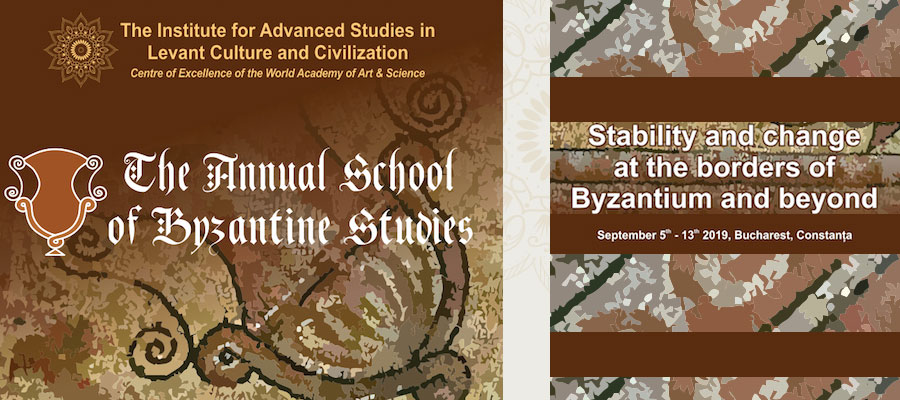Stability and Change at the Borders of Byzantium and Beyond, School of Byzantine Studies, Bucharest and Constanța, September 5–13, 2019
The Institute for Advanced Studies in Levant Culture and Civilization (ISACCL), in partnership with the University of Bucharest, the Ovidius University of Constanța, and the National University of Political Studies and Public Administration, is organizing the 2nd edition of the School of Byzantine Studies, to be held between September 5th and 13th 2019 in Bucharest and Constanța (in Romania).
Following the success of the previous year’s edition, dedicated to tackling “Byzantine representations in literature, art and history” (2018), the 2019 edition will focus on “Stability and change at the borders of Byzantium and beyond”.
Whether modern scholars have concentrated on the internal evolution of the Byzantine Empire or have attempted to integrate the Byzantine civilization into a broader cultural context, the concepts of stability and change have continually informed scholarly approaches to Byzantine studies over the past two centuries.
The School of Byzantine Studies will engage participants in a stimulating dialogue attempting to define the borders of Byzantium in a highly dynamic historical context, marked on one side by emergent local literary and philosophical cultures and on the other by the tension of central power radiating from Constantinople. Byzantine Church art and architecture, as present in the Romanian space, will be employed as the principal means of identifying the established cultural models and exchanges that took place at the borders of the Byzantine Empire on the Lower Danube, critically and comparatively analysed in relation with the Balkans and with Asia Minor.
The School of Byzantine Studies will feature a number of scientific lectures from established specialists in a number of subfields of Byzantine Studies (literature, palaeography, history, theology, philosophy, history of art), aiming to impart an advanced knowledge of current research trends and methods to the participants as well as habituate them with various kinds of primary and secondary sources (texts, images, material culture etc.). Those attending will have the opportunity to actively get involved in the proceedings and contribute to the collective debate and discussion through the option of presenting their MA or PhD projects to the assembly.
The participants will also have the opportunity to explore a number of local monuments of post-Byzantine art in Romania, such as the Stavropoleos Monastery, the Old Court (Curtea Veche), the Cotroceni Palace Museum and Mogoșoaia Palace (Bucharest), and archaeological sites in Constanța (the ancient polis of Tomis) and Histria.
The organizers are hereby launching a call for applicants for a total of 15 participant places. Qualifying candidates will be drawn from among interested Masters students, PhD candidates and young post-doctoral researchers. The participants are required to have a fluent grasp of the English language.
If successful, applicants will be entitled to attend in full the seminars and courses organized as part of the School of Byzantine Studies, to organized visits of historical sites across Bucharest and archaeological dig sites in Constanţa, to accommodation and transport around both Bucharest and Constanţa, as well as to one full meal per day for the duration of the School. Airplane fees will need to be covered by the participants themselves.
